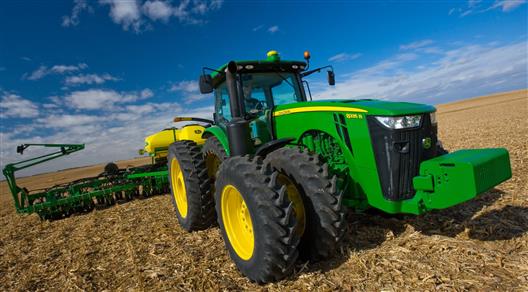Arkansas farmers oppose mega merger between Bayer and Monsanto
by December 27, 2017 1:39 pm 1,083 views

A proposed $66 billion merger between German-based pharmaceutical giant Bayer and agricultural company Monsanto has opposition from farmers in Arkansas and other agriculture dependent states.
Both companies own patents for genetically modified seeds, herbicides, pesticides, and other agriculture-related products. More than a million people have signed a petition asking for the Department of Justice to block the merger. If formed, the company would control about one-fourth of the world’s seed and pesticide supplies.
In Arkansas, the proposed Bayer-Monsanto company would control 90% of the cottonseed planted, Gould-area farmer Chase Gasaway told Talk Business & Politics. Last week, Farmers and Families First released a white paper detailing how the proposed merger would raise aggregate seed prices by 5.5% and raise cottonseed prices by more than 20%. A merged Bayer-Monsanto would control over 35% of the global market for corn seeds, roughly 28% of the global soybean market, almost 70% of the global cottonseed market and up to 69% of U.S. approved herbicide-tolerant seeds for alfalfa, canola, corn, wheat, soybean and cotton.
“It’s really hard to see how this will benefit us … they would have a stranglehold on our cotton,” Gasaway said. “Prices will skyrocket, jobs will be lost, and prices hikes will be passed on to consumers. They will have a monopoly.”
Officials with Bayer and Monsanto have said the mega company would provide better products for farmers. The two companies would be able to combine research resources.
Bayer officials said the combined business will benefit from Monsanto’s leadership in seeds and traits and climate corporation platform along with Bayer’s broad crop protection product line across a comprehensive range of indications and crops. The companies contend growers will benefit from a broad set of solutions to meet their current and future needs, including enhanced solutions in seeds and traits, digital agriculture, and crop protection, according to Bayer.
The combination would also bring together both companies’ innovation capabilities and R&D technology platforms, with an annual pro-forma R&D budget of approximately $3 billion. Over the mid to long-term, the combined business will be able to accelerate innovation and provide customers with enhanced solutions and an optimized product suite based on analytical agronomic insight supported by digital farming applications, the two groups said.
“We are pleased to announce the combination of our two great organizations. This represents a major step forward for our Crop Science business and reinforces Bayer’s leadership position as a global innovation driven Life Science company with leadership positions in its core segments, delivering substantial value to shareholders, our customers, employees and society at large,” Bayer CEO Werner Baumann said when the proposed merger was announced in September 2016.
CONCERNS REMAIN
Robert Lawrence, a professor at Johns Hopkins School of Medicine, is the founding director of the Center for a Livable Future. A former Centers for Disease Control official, Lawrence said in a recent Marketwatch interview that the merger would be more likely to curtail genetic diversity among seed growers.
“The consolidation and driving out of smaller competitors, and controlling the marketplace and raising prices of seeds and pesticides for farmers worldwide is going to be a real shock to the food system,” he said.
Lawrence cited a current reduction in biodiversity as already happening. He said a Monsanto-Bayer merger would further that trend, which would result in crops being more vulnerable to disease and potentially higher consumer prices.
Bayer and Monsanto are the two primary cottonseed providers in the Mississippi Delta Region, Gasaway said. A fourth generation farmer, he primarily grows cotton on his 6,000-acre farm. The combined company would control about 65% of the soybean seeds sold in Arkansas, too. Competition between companies benefits farmers when they negotiate seed prices, he said. This would eliminate that.
“It would be like GM buying Ford and then we would only have one car to choose from,” he said.
Grady farmer John Curtis Jackson agreed with Gasaway. Bayer and Monsanto have patents on their seeds, meaning even if a farmer grows with those seeds he can’t harvest those seeds with intent of planting them next year. It’s an illegal practice, he said. Jackson grows soybeans, rice, and corn, and some years he grows cotton on his 4,500-acre farm. Farmers have to worry about water, weather, and labor problems. Input costs for seeds and chemicals can mean the difference between small farm thriving or merely surviving, he said.
“We have to have these technologies, but we need reasonable input costs,” he said.
ARKANSAS STATS
Farmers in Arkansas planted 3.5 million soybean acres in 2017, by far the most farmed crop in the state. It’s the 10th largest soybean producing state in the country.
The impact soybeans have had on the Natural State cannot be overestimated. In 2016, 3.1 million acres were harvested in 41 of Arkansas’ 75 counties. The 145.7 million bushels produced has a value of $1.4 billion, almost 20% of the state’s agricultural sector.
Arkansas is ranked third nationally in cotton production. The crop is projected to produce 1.06 million bales, about 60,000 more than was projected last month. It’s 22% (220,000) more than was produced in 2016. A record yield is now also projected. Yields are expected to be 1,162 pounds per harvested acre, up 66 pounds per acre from earlier projections, and up 87 pounds from last year. Farmers planted 438,000 cotton acres in 2017, a 16.8% (63,000 acres) uptick.
A decision on the merger is expected in early 2018. In addition to opposition by American farmers and consumers, there are several European countries and agencies that have voiced opposition to the merger.
